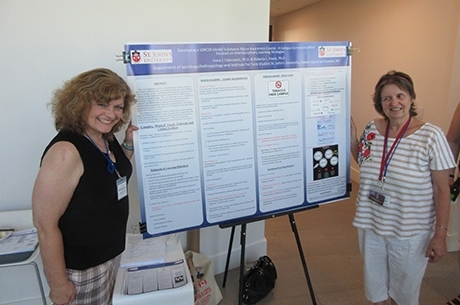
Two faculty members on St. John’s University’s Staten Island, NY, campus are leading an initiative that teaches scientific and sociological concepts by encouraging students to address problems in their neighborhood.
Associate Professors Roberta L. Hayes, Ph.D., and Irene J. Dabrowski, Ph.D., have developed interdisciplinary courses in their respective fields of Scientific Inquiry and Sociology that follow the Science Education for New Civic Engagements and Responsibilities (SENCER) model, which enhances student learning by connecting course topics to issues of critical local, national, and global importance.
“Students do not learn by memorizing facts,” said Dr. Hayes. “They need to understand how science impacts their daily life in a social context and, hopefully, be moved to civic action.”
Since 2014, the St. John’s initiative has been funded by a competitive $3,000 implementation grant from the National Center for Science & Civic Engagement (NCSCE), the national organization that oversees SENCER. The grant allows the professors to purchase necessary supplies like microscopes for students to use, as well as invite speakers to the campus.
The first SENCER project, which took place during the 2014–15 academic year, featured the New York City Street Tree Census, which occurs every 10 years and includes data collected by volunteer citizen scientists. Student volunteers recorded data points including the distance between trees, tree girth, and overall tree health into iPads provided by the New York City Department of Parks and Recreation. They also discussed the impacts of trees on developing neighborhoods, including the environmental, social, psychological, and physical health aspects.
The following year, 2015–16, students participated in the NYC Healthy Neighborhoods Program along with Robert Fanuzzi, Ph.D., Associate Provost for Academic Affairs, and Director of Civic Engagement and Public Programs at the Staten Island campus. Students learned about the healthy construction of communities by surveying local schools, healthcare institutions, and the Staten Island campus about health concerns.
As an extension of this endeavor, students participated in Tobacco-Free Staten Island, a movement to create a tobacco-free environment within the borough. The students developed a campus-wide survey—which continued into the fall 2018 semester and expanded to include the Queens campus—to gauge support for a tobacco-free University and develop an implementation plan.
Based on the findings that substance abuse is a major issue for Staten Island, Dr. Hayes and Dr. Dabrowski refocused their aim on the problem of addiction for the 2017–18 academic year. To address this problem, students learned about different kinds of drugs and their effect on the brain and body, as well as social factors like the role of family and peers, as well as institutions like the media. Students in both courses produced electronic portfolios, posters, and public service announcements that they shared across classes during an “open dialogue day.” They also presented their projects during Research Month.
Sociology major Nawal Moustafa ’18C organized a substance abuse awareness night, and invited officials from the Too Smart to Start public education initiative. At the event, recovery and rehabilitation service providers trained attendees in administering naloxone, an emergency treatment for narcotic overdose.
As part of the initiative, the professors hosted a “Science, Sociology & Civic Engagement” series of speakers on the Staten Island campus during the Spring 2018 semester. Ellen Boegel, J.D., Professor, Criminal Justice, Legal Studies, and Homeland Security, presented the legal ramifications of medical marijuana as opposed to recreational marijuana in the context of federal and state laws. At another talk, Luke J. Nasta, Chief Executive Officer of Camelot, a chemical dependency treatment program, accompanied a young man enrolled in Camelot’s residential program, who spoke to students about his struggle with addiction and answered their questions. Students wrote reflections about the talk as part of an Academic Service-Learning (AS-L) project.
Jeffrey W. Fagen, Ph.D., Dean, St. John’s College of Liberal Arts and Sciences, has sponsored the team’s travel to the SENCER Summer Institutes for the past five years as part of his support for faculty development of new projects. The 2018 Summer Institute was held at Santa Clara University in Santa Clara, CA, from August 2 through 5. Dr. Hayes and Dr. Dabrowski presented the addiction project at the conference.
“Drs. Hayes and Dabrowski have been longtime leaders in SENCER’s national community of practice and have inspired colleagues with their innovative and bold approaches to curricular integration,” said Eliza Jane Reilly, SENCER’s Executive Director. “Their work is a model of civically engaged science education that improves learning while deepening awareness of one of the toughest civic problems in the nation—substance abuse.”
As the SENCER initiative grows on Staten Island, Roberta L. Hayes, Ph.D. (left), and Irene J. Dabrowski, Ph.D., see it increasingly become more interdisciplinary, encompassing not just science and the social sciences, but also the humanities. As a testament to her commitment to SENCER, Dr. Hayes was selected for the 2018 cohort of the SENCER Leadership Fellows program. “This is a continuous project that is growing in new directions,” said Dr. Dabrowski.
